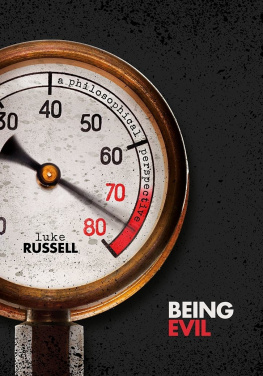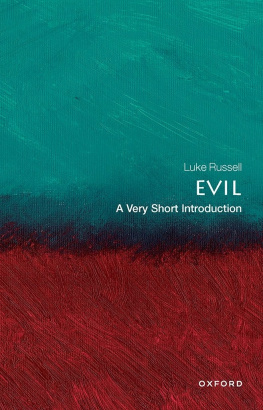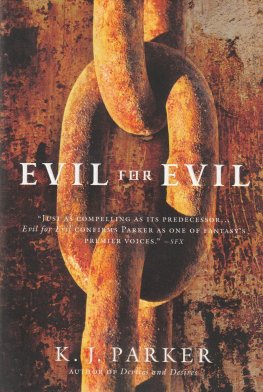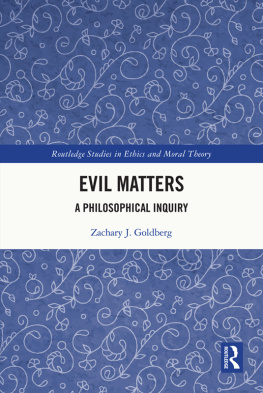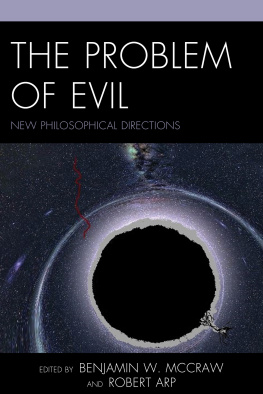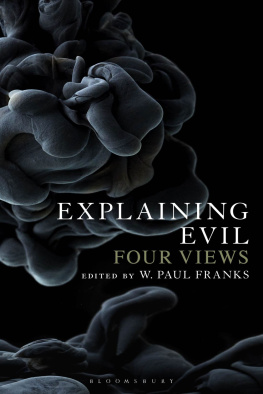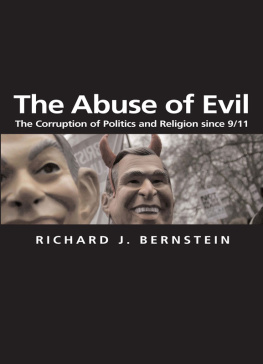Being Evil

Great Clarendon Street, Oxford, OX2 6DP, United Kingdom
Oxford University Press is a department of the University of Oxford. It furthers the Universitys objective of excellence in research, scholarship, and education by publishing worldwide. Oxford is a registered trade mark of Oxford University Press in the UK and in certain other countries
Luke Russell 2020
The moral rights of the author have been asserted
First Edition published in 2020
Impression: 1
All rights reserved. No part of this publication may be reproduced, stored in a retrieval system, or transmitted, in any form or by any means, without the prior permission in writing of Oxford University Press, or as expressly permitted by law, by licence or under terms agreed with the appropriate reprocgraphics rights organization. Enquiries concerning reproduction outside the scope of the above should be sent to the Rights Department, Oxford University Press, at the address above
You must not circulate this work in any other form and you must impose this same condition on any acquirer
Published in the United States of America by Oxford University Press
198 Madison Avenue, New York, NY 10016, United States of America
British Library Cataloguing in Publication Data
Data available
Library of Congress Control Number: 2019956705
ISBN 9780198862079
ebook ISBN 9780192606631
Printed in Great Britain by
Bell & Bain Ltd., Glasgow
Links to third party websites are provided by Oxford in good faith and for information only. Oxford disclaims any responsibility for the materials contained in any third party website referenced in this work.
Contents
Does evil exist? To answer that question we first have to know what evil means. What do you think of when you hear that word? Is it a stereotypical villain from the movies or from literary fictionVoldemort from Harry Potter, Ramsay Bolton from Game of Thrones, or the Emperor from Star Warsthe kind who actively seek to destroy others, who delight in inflicting suffering, and who cackle while contemplating their malicious deeds? Perhaps instead you think of superheroes who are called to use their power for good, not evil. Maybe what springs to mind is Googles former corporate motto: Dont be evil. When people use the word evil in these contexts they seem to be indulging in playful hyperbole. Evil is scary and bad, but it is so exaggeratedly scary and bad that there is something unrealistic, even ridiculous, about it. Evil, in this sense, teeters on the edge of the comical. The character of Dr Evil from the Austen Powers films steps right over this edge. How silly, how childish, we might say, to be frightened of eeeevil. If we were to focus on examples like these, we might conclude that there is no room for the concept of evil in serious thinking about morality.
For some people the word evil carries a different set of connotations. Rather than belonging in the realm of fiction, it sounds distinctly religious. When we look to Christianity, for example, we find plenty of references to evil. In the Garden of Eden Adam and Eve ate the forbidden fruit and gained knowledge of good and evil. When Christians say the Lords Prayer they ask to be delivered from evil. Thomas Aquinas says that we should do good and avoid evil. The idea here seems to be that evil is simply the opposite of good. Elsewhere in Christianity, a more radicalsome would say outlandishconception of evil appears to be in play. The Gospels contain repeated references to Satan, an evil supernatural being who causes illness and enters into the hearts of humans, leading them to sin. The Book of Revelation describes Satan in the form of a giant dragon engaging in a cosmic battle with God. To those of us who do not believe in the existence of God or malevolent spirits, this supernaturalist conception of evil seems to be just as fanciful as the kind of evil that is depicted in Harry Potter or Star Wars. Moreover, it appears to be dangerous to believe that this kind of supernatural evil exists in the real world. We should not forget the terrifying witch trials of the 17th century, in which thousands of innocent people were tortured and burned at the stake, all because of misguided beliefs in evil spirits and demonic possession. Contemporary politicians who use the language of evil are sometimes accused of fostering exactly this kind of moral atmosphere; of demonizing their opponents, of whipping up the angry mob, of inciting wanton destruction. Some philosophers survey this landscape and conclude that we ought to be sceptical of the existence of evil. Evil seems to be an outdated concept, and a dangerous one, at that.
But should we, on the basis of these examples, rush to the conclusion that evil is not real? According to the philosopher Ludwig Wittgenstein, a common cause of philosophical disease is a one-sided diet: one nourishes ones thinking with only one kind of example. Consider an analogy: if you want to understand the nature of politics but you focus only on Western liberal democracies, you will fail to grasp the distinctive features of monarchies, communist states, dictatorships, and so on. Similarly, if you want to understand the nature of music it would be misleading to focus only on heavy metal and simply ignore classical symphonies, African drumming, jazz, and so on. When conducting a philosophical investigation we are best able to gain knowledge by considering a diverse range of cases. Those who hope to understand the nature of evil by focusing only on fantasy, science fiction, and religious texts are consuming just this kind of one-sided diet. Instead of limiting our focus in this way we should also look at the broad range of real-world scenarios in which ordinary people are inclined to use the word evil. Unfortunately this is a grim task, and is prone to induce disgust and despair. It is hard to think clearly about the worst moral transgressions in human history. Nonetheless, this is what we must do if we are to figure out what evil is supposed to be, and whether it exists. After considering these examples some of us might still conclude that there is no such thing as evil. It could turn out that people who believe in the existence of evil are falling into some kind of confusion, are exaggerating, or are mistakenly projecting onto the world something that, in reality, is not there. We should not prejudge the matter either way. Let us begin by taking note of what ordinary people say and what they believe about evil, and then we can move on to ask whether their claims and beliefs are correct.
When we survey the wide range of cases in which people say that things are evil, we notice something quite surprising. Sometimes we use the word evil simply as a synonym for bad. When we do so evil need not have any connotations of extremity. Just as there can be minor or trivial bad things, there can be minor or trivial evil things, in this sense of the word. Suppose that you face a dilemma, and you have to choose between two bad options. You might explain your ultimate decision by saying that you chose the lesser of two evils. When you use the word evil in this way, you are not implying that both options were extreme and horrific. You are simply indicating that you chose the least bad of the two. When the word evil is being used merely as a synonym for bad it can be applied to things that are blameworthy moral wrongs, such as malicious assaults, but it can also be applied to things that are bad without being immoral, including the pain that you suffer when you stub your toe. When we consult the

